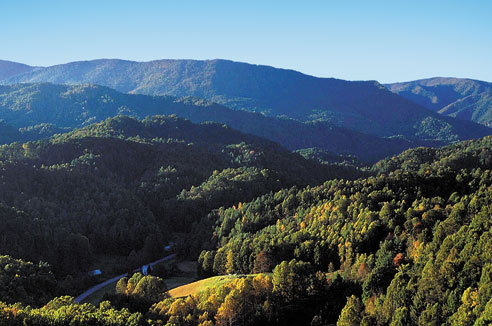Human activities can worsen ‘blue haze’, says researcher
 Washington, October 7 : Human activities can worsen “blue haze”—a common occurrence that appears over heavily forested areas around the world due to natural emissions of chemicals—to the point of affecting the world’s weather and even cause potential climate problems, says a Texas A&M University researcher.
Washington, October 7 : Human activities can worsen “blue haze”—a common occurrence that appears over heavily forested areas around the world due to natural emissions of chemicals—to the point of affecting the world’s weather and even cause potential climate problems, says a Texas A&M University researcher.
Renyi Zhang, a professor of Atmospheric Sciences who has studied air chemistry for over two decades, says that blue haze—tiny particles or aerosols suspended in the air—can be negatively affected by human activities such as power plants or fossil-fuel burning.
He highlights the fact that man-made activities, mainly large power plants that emit huge amounts of particles into the air, can worsen blue haze and cause previously unforeseen problems.
“The study shows that the natural way of blue haze formation is rather inefficient and that human activities make blue haze conditions worse,” he says.
“What happens is that a mix of natural and man-made chemicals speeds up the formation of these particles in the Earth’s atmosphere, and there, they reflect sunlight back into space. The results can affect cloud formations and ultimately, much of the world’s climate,” he adds.
The research team—including experts from Brookhaven National Laboratory in New York, the Molina Center for Energy and Environment in La Jolla, California, and the Massachusetts Institute of Technology—point out that when man-made activities emit sulfur dioxide into the air, they contribute to blue haze, usually in a negative way.
Zhang notes that aerosols can be produced by many different processes that occur on land and water or in the atmosphere itself.
“Weather patterns can be affected worldwide and the blue haze can worsen the breathing problems of many people, such as those who suffer from asthma or emphysema,” he says.
“The chemistry of Earth’s atmosphere can be directly affected by these aerosols. From cloud formations to health problems and air pollution, much of it can be traced back to these aerosol particles,” the researcher adds, noting that aerosol particles can influence the size and rate of cloud droplets, directly affecting cloud cover and precipitation.
According to Zhang, coal plants often produced sulfur dioxide, a highly toxic substance that reach the Earth’s atmosphere, and helps the formation of aerosol particles.
He stresses that this problem is not new, for former President Ronald Reagan once mentioned it during a speech about three decades ago.
Zhang also stressed the need for more research “study the full extent of how blue haze is affected by human activities, and perhaps to look at ways to control the situation. It’s a problem that can have global consequences.”
A research article on his team’s study has been published in Proceedings of the National Academy of Science. (ANI)